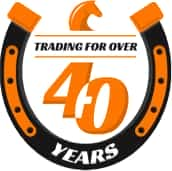What to Feed Horses (and What Not to Feed) Forses
Horses are herbivores with specific dietary needs that need to be met to maintain their health and well-being. If you are new to equestrianism, you may assume that as we often see horses in the field grazing, grass is all they need. While their diet should consist primarily of high-quality forage, such as hay or pasture grass, there are lots of other factors to consider.
Horses have a sensitive digestive system that is quite different from that of humans and other monogastric animals (animals with a single-chambered stomach). Horses are classified as hindgut fermenters, meaning their digestion primarily takes place in the large intestine rather than the stomach.
A horse’s sensitive digestive system has limited stomach capacity, which means that eating little and often is better for them, they need a continuous forage (fibrous) intake to maintain proper digestive function, and they need to avoid sudden diet changes that may disrupt their sensitive microbial balance (which could lead to colic). Plus, their delicate stomachs mean they tend to be prone to digestive disorders such as nasty gastric ulcers and colic if they are exposed to foods that do not agree with them regularly.
With all this in mind, the need to provide horses with a consistent and appropriate diet is paramount. Here are some essential horse care tips to keep in mind:
What to feed horses
Horses like to eat little and often throughout the day and therefore, will need to always have access to roughage (also known as forage) such as grass, hay, haylage etc, and fresh water of course. Horses are natural foragers who enjoy eating grasses of different varieties and age as well as other plants, like weeds and herbs, so sticking to a diet that replicates their natural diet will generally serve them best for a healthy balance. Most horses in light work will only need roughage and water to meet their nutritional needs, though a horse that is worked harder may have to supplement their roughage with grains or concentrate mixes.
Typically, a horse will need access to:
- Pasture grass that contains essential nutrients need by a horse and silica, which is important for their dental hygiene.
- Hay for maintaining a horse’s digestive system and keeping the horse full for longer (particularly in winter when pasture isn’t available). It’s advisable to have hay tested for quality, any damage, and lack of nutrients. If they lack vitamins and necessary nutrients, their diet can be topped up with supplements. A sturdy hay barn or shelter is recommended for storing to keep the hay damage free.
- Pitted fruits (to avoid your horse choking) and vegetables can add a little moisture to your horses feed and can be given in moderation, as a treat. Fruit has a high sugar content, so it really should be provided as a treat now and then rather than every day. For example, can horses eat pumpkins? Yes, they can, but it should be given in moderation.
- Grains that are harvested and processed organically can be fed to horses in small amounts. Safe grains for horses include oats, maize, barley, and wheat.
- Concentrate mixes made up of a mix of cereals and grains, supplements, and minerals, can be fed to horses to supplement their diet if needed. If your horse needs to add weight, increase energy levels, or needs a boost in their overall health these mixes are a great way to provide them with the nutrients they might be lacking.
- Salts, such as salt licks are ideal for supplementing a horse’s diet with essential vitamins and minerals whilst entertaining them in the process. The salt will naturally make them thirsty which will encourage them to keep hydrated too. Hay grains and horse supplements are also a great source of sodium so again, offer salt blocks to your horse in moderation. Likit and Horselyx tend to be among the most popular brands recommended by horse owners.
How much grass and hay should my horse eat?
Typically, it is recommended a horse should eat 2-2.5% of their body weight in grass or hay every day, which means the average adult horse weighing 450kg will need to consume around 11kg daily. If you feed your horse concentrates, such as grain, as part of its diet, then roughage should still make up at least 50% of their daily food intake by weight.
What is the difference between grass, hay, and haylage?
Grass, hay, and haylage are the most common types of roughage provided to horses, but if you are new to the equine world, you may be confused at what the differences are between them considering they all derive from the same source. Here’s an overview of each:
- Grass: Grass refers to live, growing vegetation that horses graze on when they have access to pasture. Pasture grass provides natural, fresh forage that is rich in nutrients. It is the most natural and preferred form of forage for horses, allowing them to exhibit their natural grazing behaviour. However, the availability of pasture grass depends on the season, climate, and management practices.
- Hay: Hay is dried grass or other plants that are cut, cured, and stored for later use as forage. The process of cutting and drying preserves the nutritional value of the plants. Hay is typically harvested when the grasses or plants have reached a specific growth stage and are at their maximum nutritional value. It provides a source of forage when pasture grass is limited or unavailable, such as during winter or in areas with limited grazing land. Hay can be stored and fed to horses throughout the year.
- Haylage: Haylage, also known as silage, is forage that has undergone a fermentation process before being stored and fed to horses. It involves chopping the grass or other forage, packing it tightly into airtight containers, and allowing it to ferment. The fermentation process produces acids that help preserve the forage and retain its nutritional value. Haylage typically has a higher moisture content compared to hay, and it has a slightly fermented smell. It can provide a nutritious alternative to dry hay and is often used when higher moisture levels are desired in a horse’s diet, such as for horses with dental issues or those needing additional hydration.
The choice between grass, hay, and haylage depends on factors such as availability, season, nutritional needs of the horse, and specific management practices. All three forms of forage can be suitable for horses, but it’s important to ensure they are of good quality, free from moulds or contaminants, and meet the nutritional requirements of the horses being fed. Consulting with an equine nutritionist or veterinarian can help determine the most appropriate forage options for your horses based on their specific needs and circumstances.
What not to feed horses
There are several foods and substances that should be avoided when feeding horses as they can easily cause harm or digestive upset:
- Toxic plants: Horses should not have access to or be fed toxic plants such as yew, oleander, red maple leaves, ragwort, bracken fern, and certain varieties of cherry trees. These plants can be poisonous and cause serious health issues or even be fatal if ingested.
Here you can check the list of ten poisonous plants for horses that you should be aware of.
- Certain fruits and vegetables: While horses can consume some fruits and vegetables in moderation, there are a few that should be avoided. Avocado, onions, garlic, tomatoes (particularly the green parts), and potatoes (raw or uncooked) can be toxic or cause digestive upset in horses.
- High-sugar or high-starch feeds: Horses have a limited tolerance for high-sugar and high-starch feeds, which can disrupt their sensitive digestive system and increase the risk of conditions like laminitis. Foods like sugary treats, sweets, cereal grains, and excessive amounts of sweet fruits should be avoided or given sparingly.
- Dairy products: Horses are lactose intolerant in adulthood, and dairy products such as ice cream can cause serious, pain, discomfort, and digestive problems like diarrhoea. A very small amount would probably not be problematic, but there’s much better treat alternatives.
- Mouldy or spoiled feed: Mouldy or spoiled hay, grains, or other feeds should never be fed to horses. They can contain toxins that can cause colic, respiratory issues, or other health problems.
- Human food and beverages: Horses should not be fed human food or beverages. Many foods meant for human consumption, such as chocolate, caffeine, alcohol, and certain spices, can be toxic to horses.
- Medications and supplements without veterinary guidance: It is crucial not to administer medications, supplements, or herbal remedies to horses without veterinary guidance. Some substances may be harmful or interact negatively with a horse’s system, and dosages should always be determined by a veterinarian.
- Abrupt diet changes: Horses have sensitive digestive systems, and abrupt changes in their diet can lead to digestive upsets and colic. Any dietary changes should be made gradually over several days to allow the horse’s system to adjust.
Here is a handy at-a-glance guide to what you can and can’t feed your horse as a treat:
Help Stop the Public for unauthorised Feeding of Horses
When we understand how sensitive a horse’s digestive system is and how damaging the wrong diet can be for a horse, it is easier to educate others on why feeding other people’s horses without permission is not okay due to the risky consequences. Help us spread the word by reading up on how to help stop the unauthorised feeding of horses.
Due to their sensitive digestive system, it’s important to provide horses with a consistent and appropriate diet. This means ensuring a regular supply of high-quality forage, avoiding sudden dietary changes, always providing clean water, and consulting with a veterinarian or equine nutritionist to develop a feeding plan tailored to each horse’s specific needs. They can offer guidance and advice on what to feed and what to avoid based on your horse’s individual requirements and any specific health considerations.
In addition to food, finding reliable and specialised shelter or hay barn to store their food, such as hay and wheat, safely is equally important to maintaining your horse’s good health.
At National Timber Buildings, we provide a comprehensive range of specialist timber buildings to fit your needs, from wooden stables, hay barns and mobile field shelters. If you wish to find out more, please request a brochure or call us at 01233 740 944 to chat with our friendly and knowledgeable team today. For more stable management tips and advice, please contact us anytime.



